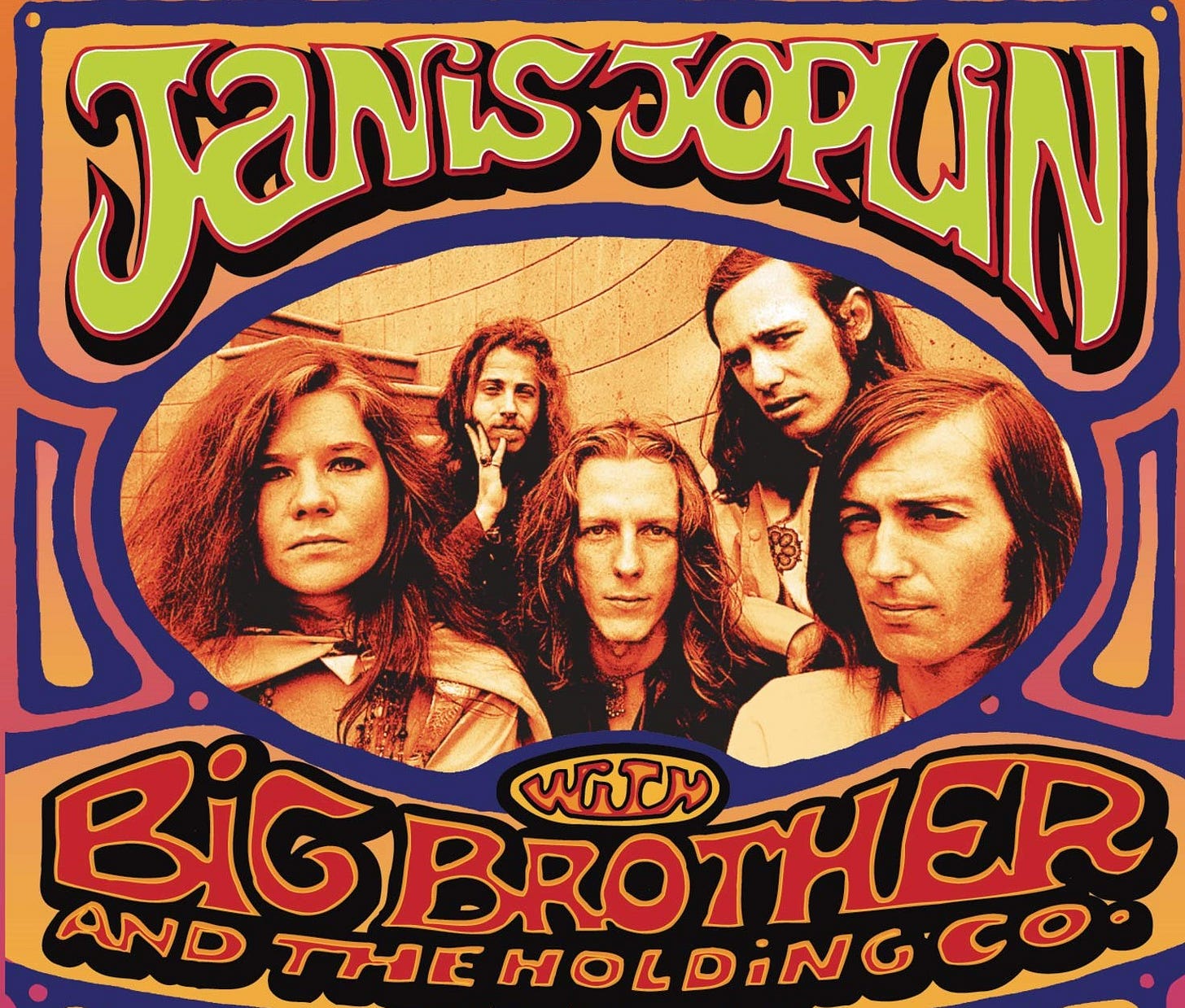Big Brother & The Holding Company: The 1978 Sam Andrew and James Gurley Interview, Part 2
On Drugs, Creativity, Songs, Gear, and the Psychedelic ’60s
Here’s the second half of my two-hour interview with James Gurley and Sam Andrews. This takes up where Big Brother & The Holding Company: The 1978 Sam Andrew and James Gurley Interview, Part1 left off. Near the end of our time together, I asked Sam about his musical upbringing. This section is included below.
###
How long has it been since you’ve seen each other?
James: Yesterday was the first time in at least five years.
Do you keep in touch?
James: Not hardly at all.
How did you get together this time?
James: Chet [Helms] pulled it together again. Well, Chet was the one who got Janis with the band. See, Chet’s from Texas, and like I said before, Peter and I had seen Janis sing at the Coffee Gallery a year before or so. We were looking for singers – we were auditioning all these singers – and we said to Chet, “There was this chick we saw at the Coffee Gallery a year ago. She was the one. She had a real powerful voice.” So it turns out that he knows her, you know. He says, “Oh, I know her. I know where she is, as a matter of fact.”
Sam: He’d gone to school with her.
James: Yeah, he’d gone to school with her and everything, and he sent for her and she came. Just like that. There it was. It was amazing that he knew her at all, and how the circle of events all just went around like that.
Sam: About a year ago – talking about how we got together again and everything – I went into dreams about it. I’d dream about it, like in the daytime, of the four of us going out with Kathi [McDonald] and doing this again. But I’m the kind of person who’d never organize that. I’m not oriented that way. But Peter would, if any of us would. He’s more business-oriented. He’s an organizer, whereas I would think of it but never do anything about it. So it’s great that Chet did it.
Have you considered getting the band back together for more than this gig?
James: No, I don’t think we’ve considered it, really. We haven’t talked about it at all.
Sam: I’d like to consider it. I vote yes. I’d love to do it.
James: It’s kind of difficult to do it now, because I live out in the desert and Dave lives in L.A.
Sam: It’s more difficult because we really haven’t talked to each other in all this time. So we’re all still a little tentative, just feeling around and seeing what’s going on.
James: Yeah. Just to get this job done tomorrow is the important thing at this point. One step at a time. Mainly it’s Chet bringing it all together, because he’s the only guy who can do it. It’s fantastic.
Sam: Considering the source – considering Chet as a person – it’s like the thing I was saying about Hendrix. His thought process are taking it to a whole other level. He’s got the business level going.
He started everything.
Sam: He’s a starter, yeah. And from the right way, too, which starters usually are, and then there’s a second person. There’s the thing about human movement, up comes the other. Like the Bolshevik Revolution of 1917 – they had to kill off the guys who started it because they were too heavy into it. They believed in it, and the other guys said, “Ah, get rid of him. Take him in the back room.”
James: Right. Get rid of that guy.
Sam: Because they can’t take it. It’s almost too heavy for history or too heavy for everybody. It’s the price.
What did you guys feel back when reviewers started panning your sound?
James: Oh, yeah. Yeah.
Some went so far as to say that’s why Janis left.
Sam: I felt like they were absolutely right, considering their rules of the game. They were playing by their rules, and they were right by their rules. But I don’t think they saw that another game was being played, one that they couldn’t see at all.
Which was what game?
Sam: Just the things we were saying, that the expression was the more important thing and it was the time in history for that to happen. The scale had to be balanced for that to come up.
To where the music’s energy is more important than its structure?
Sam: Yeah, although I shy away from even trying to nail it down that much. We were talking about this tune “I’ll Change a Flat Tire, Merle.” There’s a band called Pure Prairie League who did that. They did it better than we did – people will argue about that stuff, and they may be right. Whatever. But that’s my opinion – they did it better than we did, but we did it first. And it’s always easier to build the second step after the first step.
James: After somebody has already done it, it’s easy the second time.
Sam: You have to make choices. You can reject this or that. But when it’s all just coming out for the first time, it’s hard. Covering a record is like that. Pure Prairie League is great – you understand what I’m saying. So about the critics: Their criticisms were perfectly valid in terms of what they saw.
Keep reading with a 7-day free trial
Subscribe to Talking Guitar ★ Jas Obrecht's Music Magazine to keep reading this post and get 7 days of free access to the full post archives.




